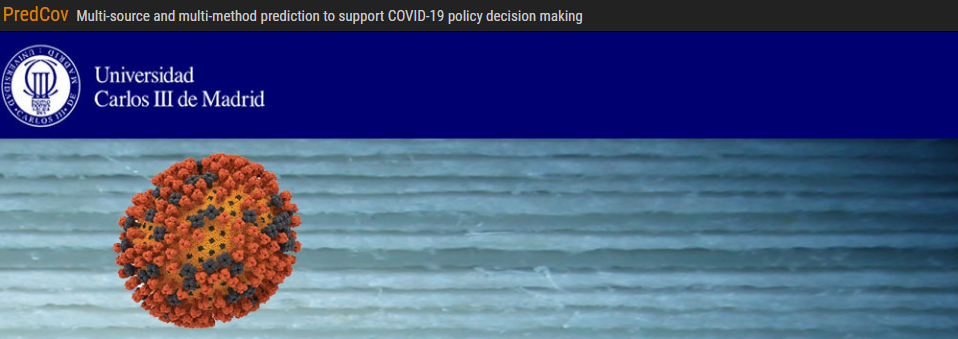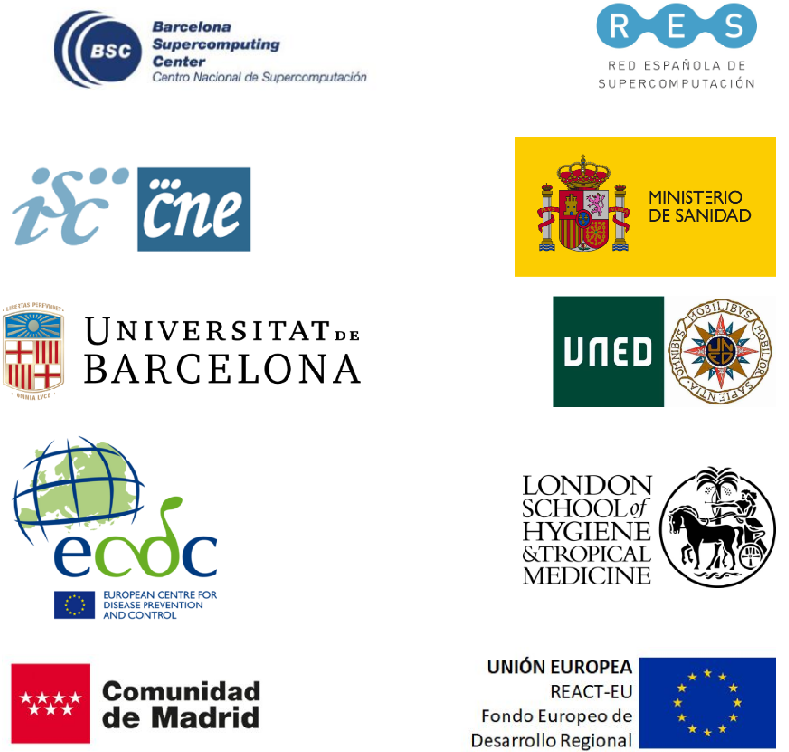PredCov Multi-source and multi-method prediction to support COVID-19 policy decision making
- Grupos de investigación
- Ingeniería
- Computer Architecture and Technology Area (ARCOS)
- Research
- Projects
- PredCov Multi-source and multi-method prediction to support COVID-19 policy decision making

PredCov
The main project goal is to develop a system that integrates different information sources to model future scenarios for the spread of COVID-19 (or other similar contagious diseases) with a transversal approach that combines epidemiological, social, economic and media aspects.
The project groups different research lines:
Monitoring of the pandemic by means of digital-contact tracing techniques and online surveys.
Social behaviour analysis.
Fake news analysis.
Epidemic forecasting using three different models based on machine learning, agent-based simulation, and survey-based statistical analysis.
Economic labour market analysis.
Follow us in Linkedin and in Twitter.
This project is part of the agreement between the Community of Madrid and the Carlos III University of Madrid for the direct granting of a grant of €4,859,000.00 for the funding of research projects on SARS-CoV-2 and COVID-19 disease which is supported with REACT-EU funds from the European regional development fund “a way of making Europe”. This project was also supported by the Spanish Supercomputing Network (RES) projects BCV-2021-1-0011, BCV-2022-2-0010, BCV-2022-1-0004 and BCV-2022-1-0005.

Technologies
Monitoring:
Novel digital contact-tracing (DCT) architectures and protocols that uses existing precise geolocation information to identify potential risk contacts as well as hotspots and, at the same time, provides: (i) a high-level privacy standard, (ii) an explicit auditing process that will allow the identification of any cases in which a user misuses the information. This solution aims to address contact-tracing from a different angle in an attempt to avoid the inefficiencies of the current DCT solution that has proved to be ineffective.
CoronaSurveys gathers scientists from across the globe to study the spread of COVID-19. For almost two years now, the Coronasurveys platform has been collecting data regarding the pandemic via anonymous open surveys. This data is useful to estimate multiple parameters of the pandemic and their evolution in a simple, cost-effective, and homogeneous way across countries, in combination with other data sources. Data at a given point in time in each country, and their evolution over time, are estimated using techniques like the Network Scale-up Method.
Media analysis:
Novel media-analysis techniques for assessing the behaviour of traditional and digital media, journalistic coverage, public debate around relevant and sensitive issues for society, as well as the influence of communication technologies on public perception and citizen’s participation in public debate.
Misinformation and fake-news analysis. The information made available and shared with the public can influence their decision making, attitudes and behaviours, especially during pandemics where citizens have a desire to be well-informed. Misinformation needs to be considered a risk for all countries as it can lead to misunderstandings and the failure of public health measures.
Epidemic forecast:
Machine learning models and pattern analysis techniques based on Geolocated COVID-19 data and incidence maps, combined with pedestrian mobility, public transport use, traffic density images, shared-bicycle utilization and climatological data. These methodologies will contribute to estimating parameters of interest, such of the epidemic as the severity of the infection, and their evolution over time.
EpiGraph is an agent-based parallel simulator that performs realistic stochastic simulations of the propagation of the COVID-19 virus across wide geographic expanses. EpiGraph includes functionalities for modelling individual interactions patterns generated from social networks, contact matrices and demographical data.
CoronaSurveys provides a novel extension for forecasting the COVID-19 incidence in broad geographical areas.
Economic labour market analysis.
Methodologies to identify job and worker relocation patterns across provinces and sectors in the aftermath of the pandemic crisis. Whereas the Great Recession of 2008 can be considered a permanent crisis for some sectors (e.g. real estate) and some other ancillary sectors which recovered slowly. By contrast, Covid-19’ pandemic’s downturn major crisis understood to be a temporary one. We identify (complementary) sectors directly and indirectly affected by the shock, as well as those (substitutes) which have benefited from lockdowns and supply chain distortions during the. We propose to design optimal short-term / furlough working hours schemes that favour employee transition from declining to increasing productive activities and comparing them with the current measures.
Current incidence estimate
Link to the Current incidence estimate
Short-term forecast
Link to the Short-term forecast
Long-Term Forecast
Link to the Long-Term Forecast
Survey results
In the last years, and especially since the arrival of the covid-19 pandemic, vaccine-related information and attitudes have become a central topic of debate. This is precisely the aim of the survey, which was administered to a sample of 1.800 individuals representing the Spanish population in terms of age, gender and residence (Autonomous Community). The company ASU Fieldwork was responsible for the fieldwork.
The journalistic coverage of the covid-19 pandemic: ineffective and incomplete for almost half of Spaniards. A survey developed by researchers from the Universidad Carlos III de Madrid (UC3M) analyses attitudes towards vaccines, use of facemasks, traditional media, and social media during the pandemic.
92% of the survey respondents are vaccinated against the covid-19, but only 64% would get a booster shot without hesitation. Men and people older than 65 years are the most willing to get a booster shot.
Women and younger respondents (18 – 34 years old) use social media as their main source of information about covid-19. Moreover, vaccine hesitant individuals tend to be more active in social media.
More than half of Spaniards think that the public management of the pandemic will be crucial for their vote choice. Left-wing respondents are vaccinated in a higher proportion, while right-wing ones are more reluctant to the covid-19 vaccine, considering that the booster shot is less effective, and that the vaccine is less safe for children.
Spaniards trust more vaccine-related messages issued by health professionals, and tend to have a positive image of scientists. However, they trust governmental sources less.
Traditional media (TV and radio) have been the most used sources of information about covid-19, although part of the survey respondents have doubts about the information quality. Moreover, the survey includes two experimental questions which analyse how different messages about vaccines influence public opinion regarding two relevant topics: the booster shot and children vaccination against covid-19. Here we found that being older is associated with less reluctance towards vaccines, and that the educational level can influence the comprehension and attitudes towards vaccines. For instance, respondents with lower educational level (primary and secondary school) have a lower vaccination rate than respondents with other educational levels (professional education and university). The survey also analyses facemask use as another preventive measure, finding that people older than 55 years wear masks more, and that Madrid is the Spanish region where the use of facemasks on public transport is more frequent. The survey was designed by members of the Medialab research group from Universidad Carlos III de Madrid (UC3M) with technical advice from members of the Epidemiology National Center (CNE, in Spanish) and the vaccines group of the Health Ministry.
Publications
- Aymar Cublier Martínez, Alejandro Álvarez Isabel, Jesús Carretero, David E. Singh. Fine-grained parallel social modelling for analyzing the COVID-19 propagation. 31st Euromicro International Conference on Parallel, Distributed, and Network-Based Processing (PDP2023). Naples. Italy. 2023
- David E. Singh, Carmen Olmedo Lucerón, Aurora Limia Sánchez, Miguel Guzman-Merino, Christian Duran, Concepción Delgado-Sanz, Diana Gomez-Barroso, Jesus Carretero, Maria-Cristina Marinescu. Evaluation of vaccination strategies for the metropolitan area of Madrid via agent-based simulation. BMJ Open 12:e065937. doi: 10.1136/bmjopen-2022-065937. 2022
- K. Sherrat et al. Predictive performance of multi-model ensemble forecasts of COVID-19 across European nations. medRxiv 2022.06.16.22276024. 2022.
- David E. Singh, Miguel Guzman Merino, Aymar Cublier Martínez, Carmen Olmedo Lucerón, Aurora Limia Sánchez, Diana Gomez-Barroso, María Cristina Marinescu y Jesús Carretero. Simulación de nuevos escenarios de propagación del COVID-19 en España. XL Reunión Anual de la Sociedad Española de Epidemiología (SEE) y XVII Congresso da Associaçao Portuguesa de Epidemiología (APE). San Sebastián. Spain. 2022.
- Muñoz-Organero, M.; Queipo-Álvarez, P. Deep Spatiotemporal Model for COVID-19 Forecasting. Sensors 2022, 22, 3519. https://doi.org/10.3390/s22093519
- David E. Singh, Carmen Olmedo Lucerón, Aurora Limia Sánchez, Miguel Guzmán Merino and Jesus Carretero. Estimación del impacto de la vacunación frente a COVID-19 en la población infantil de 5-11 años. Revista Española de Salud Pública. Vol 96. e202202021. 2022.
- Miguel Guzman Merino, Maria Cristina Marinescu and David E. Singh. Evaluating the spread of Omicron COVID-19 variant in Spain. CCGrid-Life, Workshop on The 22nd IEEE/ACM International Symposium on Cluster, Cloud and Internet Computing (CCGrid 2022). Messina, Italy. 2022
- José González-Cabañas, Patricia Callejo, Pelayo Vallina, Ángel Cuevas, Rubén Cuevas, Antonio Fernádez-Anta. How resilient is the Open Web to the COVID-19 pandemic? Elsevier Telematics and Informatics. Vol. 64. 2021. JCR-Q1. https://doi.org/10.1016/j.tele.2021.101692 Open access: https://doi.org/10.48550/arXiv.2107.14534
- José González-Cabañas, Ángel Cuevas, Rubén Cuevas, Martin Mainer. Digital contact tracing: Large-scale geolocaiton data as an alternative to Buletooth-based apps failure. Electronics. Vol. 10 (9). 2021. JCR-Q3. DOI: https://doi.org/10.3390/electronics10091093. ArXiV:https://arxiv.org/pdf/2101.07024
- Catalan-Matamoros D, Elías-Pérez C. Vaccine hesitancy in the age of coronavirus and fake news: Analysis of journalistic sources in the Spanish quality press. International Journal of Environmental Research and Public Health. 2020;17(21):8136.
- Maciá-Barber C. COVID-19 en portada: radiografía ética de la cobertura fotográfica de la pandemia en España. Rev Esp Comun Salud. 2020;S1:S42-58.
- Tuñón-Navarro J, Carral-Vilar U. Has COVID-19 promoted or discouraged a European Public Sphere? Comparative analysis of the Twitter interactions of German, French, Italian and Spanish MEPSs during the pandemic. Communication & Society. 31 de mayo de 2021;34(3):135-51.
- Elías-Pérez C, Catalan-Matamoros D. Coronavirus: fear to «official» fake news boosts WhatsApp and alternative sources. Media and Communication. 2020;8(2):462-6.
- Nguyen A, Catalan-Matamoros D. Digital Mis/Disinformation and Public Engagment with Health and Science Controversies: Fresh Perspectives from Covid-19. Media and Communication. 2020;8(2):323-8.
Team
The project organitaion and research groups involved in this project are:
Project coordination:
- Epidemic models
Project coordination: David E. Singh Epidemic modelsEpiGraph, agent-based epidemic model
Computer Architecture and Technology (ARCOS), UC3M and Barcelona Supercomputing Center (BSC.Responsible: David E. Singh.
CoronaSurveys frameworkUC3M-Santander Big Data Institute (IBiDat), UC3M
Responsible: Rosa Lillo
Machine learning models and pattern analysis techniques
Telematic Applications and Services Group (GAST), UC3M
Responsible: Mario Muñóz
Markov Chain epidemic models
Econometrics, Statistics and Applied Econometrics. Universitat de Barcelona
Responsible: David Moriña
COVID-19 forecasting based on deep learning
Artificial Intelligence group. UNED
Responsible: José Luis Aznarte
Digital contact-tracing
-
Geolocation privacy-preserving architectures and protocols
Advanced Switching and Communication Technologies (ADSCOM), UC3M
Responsible: Angel Cuevas
Media analysis
-
Media-analysis techniques and misinformation and fake-news analysis
Analytics, Media and Public Engagement: Communication, Journalism and Technology Laboratory (MediaLab), UC3M
Responsible: Daniel Catalán
Economic labour market analysis
-
Methodologies to identify job and worker relocation patterns
Economic Analysis Group (RELOC), UC3M
Responsible: Juan José Dolado
Administrative-technical support
Consuelo Morán Sagredo
Erik Dueñas Rello
Collaborators
Spanish National Epidemiology Centre
Vaccination Program Area, Spanish Ministry of Health
European Centre for Disease Control and Prevention (ECDC)
London School of Hygiene & Tropical Medicine

Red Española de Supercomputación (RES)
Comunidad de Madrid regional goverment

